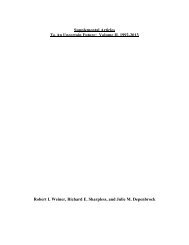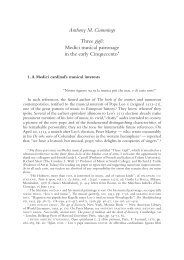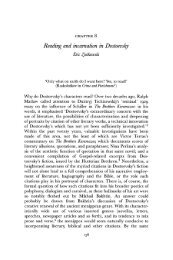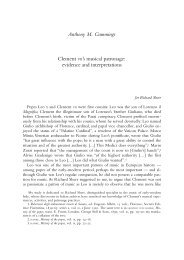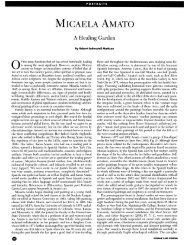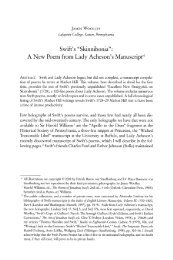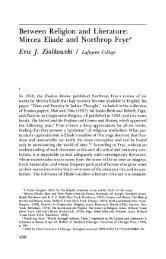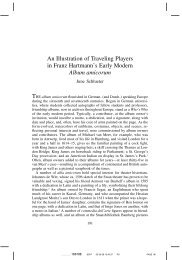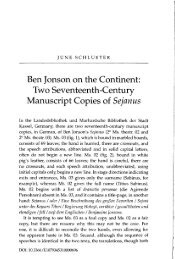courses of instruction - Lafayette College
courses of instruction - Lafayette College
courses of instruction - Lafayette College
Create successful ePaper yourself
Turn your PDF publications into a flip-book with our unique Google optimized e-Paper software.
ut custom, tradition, and habit make fixi<br />
ty and persistence the dominant forces in<br />
human history. Minor shifts and adjust<br />
ments aside, real changes in social struc<br />
tures and values are rare. Big changes are<br />
usually linked to crises and revolutionary<br />
events, some <strong>of</strong> which are provoked by<br />
advances in science and technology. This<br />
course examines what happens when sci<br />
entific and technological innovations meet<br />
social forces promoting fixity and persis<br />
tence. Mr. Schneiderman<br />
236. Energy, Environment, Society. This<br />
course helps students achieve a measure<br />
<strong>of</strong> technological literacy and understand<br />
the philosophical and social implications<br />
<strong>of</strong> modern technology. A major portion <strong>of</strong><br />
society is involved with complex interac<br />
tions among the production, economic,<br />
and "eco" systems. The production and<br />
use <strong>of</strong> energy is one area that connects<br />
these systems very closely. The effect <strong>of</strong><br />
electrical energy production on the envi<br />
ronment, global warming, and other<br />
environmental problems are discussed.<br />
Mr. Ulucakli<br />
237. Science, Anti-Science, Pseudoscience,<br />
and Nonsense. This seminar examines var<br />
ious nonscientific or anti-scientific ideas,<br />
including belief in paranormal phenomena<br />
(UFOs, astrology, psychics), religious fun<br />
damentalism (creationism, religious icons),<br />
and scientology. Students examine what<br />
"science" is, postmodern and feminist criti<br />
cisms <strong>of</strong> science, and misuse or misunder<br />
standing <strong>of</strong> science in political or legal<br />
contexts. Students gain an appreciation <strong>of</strong><br />
the value and limitations <strong>of</strong> the skeptical<br />
approach to both "scientific" and "nonsci<br />
entific" issues. Mr. Barber<br />
238. Human Reproductive Technology.<br />
This seminar examines scientific, social,<br />
ethical, legal, and political dimensions <strong>of</strong><br />
reproduction-assisting (e.g., artificial in<br />
semination, in vitro fertilization, embryo<br />
transfer) technologies. The focus is on ex<br />
isting procedures applied to humans, al<br />
though some discussion <strong>of</strong> future possibil<br />
VALUES AND SCIENCE/TECHNOLOGY SEMINAR<br />
ities (e.g., cloning <strong>of</strong> human cells, artificial<br />
wombs) is included. The seminar begins<br />
with an overview <strong>of</strong> ethical and legal prin<br />
ciples <strong>of</strong>ten applied to issues <strong>of</strong> reproduc<br />
tive technology (RT). Human reproduc<br />
tion is discussed to understand how and<br />
why reproductive technologies work<br />
and to identify social, legal, and moral<br />
challenges that arise as these technologies<br />
affect perceptions <strong>of</strong> human life, happi<br />
ness, freedom, rights, and justice.<br />
Ms. McGilliciiddy-DeLisi<br />
239. Revolutions in Science. Two<br />
revolutions in science have changed<br />
how people view self and world. The<br />
Copernican Revolution displaced human<br />
beings from their home at the center <strong>of</strong><br />
the universe, and the Darwinian Revolu<br />
tion relocated human beings on a twig<br />
<strong>of</strong> an evolutionary tree. This seminar<br />
examines the history <strong>of</strong> these episodes<br />
and its implications for an individual's<br />
worldview. Mr. Losee<br />
240. Plastics in the World. This seminar<br />
deals with the increasingly important role<br />
that plastics (polymers) play in the mod<br />
ern world. After an introduction to the<br />
structure, properties, and processing <strong>of</strong><br />
plastics, students explore new applica<br />
tions and examine some <strong>of</strong> the controver<br />
sial aspects <strong>of</strong> use, including environmen<br />
tal effects <strong>of</strong> disposal and the impact on<br />
natural resources. Mr. Martin<br />
242. The 3 C's: Conception, Contracep<br />
tion, and Carrying Capacity. This semi<br />
nar explores reproductive science and<br />
accompanying ethical issues. Students<br />
begin with an intensive overview <strong>of</strong> the<br />
evolution, physiology, endocrinology,<br />
and genetics <strong>of</strong> human reproduction.<br />
Topics include multiple births, artificial<br />
insemination, in vitro fertilization, terato-<br />
gens, genetic screening, efficacy and<br />
global distribution <strong>of</strong> contraception, and<br />
determining carrying capacity. Through<br />
out, attention is given to research and<br />
development, funding, and distribution/<br />
accessibility issues. Ms. Waters<br />
51



